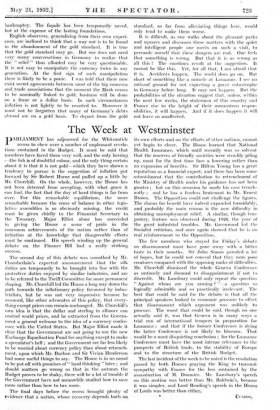The Week at Westminster
PARLIAMENT has adjourned for the Whitsuntide recess to chew over a number of unpleasant revela- tions contained in the Budget. It must be said that members have faced them very well, and the only herring —the fish 4, of doubtful colour, and the only thing certain about it is that it is not gold—which they have shown a tendency to pursue is the suggestion of inflation put forward by Sir Robert Home and puffed up a little by Mr. Churchill. On the whole, however, the House has not been deterred from accepting, with what grace it can find, the fact that the day of hard things is far from over. For this remarkable equilibrium, the more remarkable because the sense of balance in other legis- lative assemblies is so obviously missing, the credit must be given chiefly to the Financial Secretary to the Treasury. Major Elliot alone has succeeded in giving the House a sense of pride in the enormous achievements of the nation rather than of irritation at the knowledge that disagreeable efforts must be continued. His speech winding up the general debate on the Finance Bill had a really striking success.
The second day of this debate was smoothed by Mr. Chamberlain's expected announcement that the silk duties are temporarily to be brought into line with the protective duties enjoyed by similar industries, and arc to be referred to the Tariff Committee for more permanent shaping. Mr. Churchill led the House a long way down the path towards the inflationary policy favoured by indus- trialists, but he was not very impressive because he assumed, like other advocates of this policy, that every- thing except prices can remain unchanged. Mr. Churchill's own idea is that the dollar and sterling in alliance can control world prices, and he extracted from the Govern- ment a general welcome to the idea of a currency confer- ence with the United States. But Major Elliot made it clear that the Government are not going to use the new Exchange Equalization Fund for any-thing except to make a speculator's hell ; and the Government are far less likely to be worried about currency policy than about retrench- ment, upon which Mr. Buchan and Sir Vivian Henderson had some useful things to say. The House is in no mood to be put off with promises of " hard thinking " later ; and should matters go wrong so that in the autumn the Budget proves to be shaky, there will be a lot of trouble if the Government have not meanwhile studied how to save more rather than how to tax more.
The final days before the recess brought plenty of evidence that a nation, whose recovery -depends.both on its own efforts and on the efforts of other nations, cannot yet begin to cheer. The House learned that National Health Insurance, which until recently was so solvent that the reserves of friendly societies were steadily piling up, must for the first time face a lowering rather than an expansion of benefits. Sir Hilton Young has a great reputation as a financial expert, and there has been sonic astonishment that the contribution to retrenchment of the Ministry of Health under his guidance has not been greater ; but on this occasion he made his case trench- antly ; and he has a fearless lieutenant in Mr. Ernest Brown. The Opposition could not challenge the figures. The claims for benefit have indeed expanded formidably, and probably the main reason is the new difficulty in obtaining unemployment relief. A similar, though tem- porary, feature was observed during 1926, the year of the great industrial troubles. Mr. Greenwood led the Socialist criticism, and once again showed that lie is no real reinforcement to the Opposition.
The few members who stayed for Friday's debate on disarmament must have gone away with a bitter taste in their mouths. Sir John Simon paraded a lot of hopes, but he could not conceal that they were poor creatures compared with the opposing ranks of difficulties. Mr: Churchill dismissed the whole Geneva Conference as untimely and doomed to disappointment if not to discredit. Mr. Lansbury could only repeat the question " Against whom arc you arming ? "—a question so logically admirable and so practically irrelevant. The best that could be said for the debate is that all the principal speakers looked to economic pressure to effect that disarmament which argument was unlikely to procure. The worst that could be said, though no one actually said it, was that Geneva is in many ways a trial run of international tempers in preparation for Lausanne ; and that if the former Conference is dying the latter Conference is not likely to blossom, That would be a most disquieting conelusion ; for the Lausanne Conference must have the most intense relevance to the prospects of British trade, to the stability of Europe and to the structure of the British Budget.
The last incident of the week tube noted is the resolution passed by both Houses praying the King to transmit sympathy with France for the loss sustained by the assassination of M. Doumier. Mr. Lansbury's speech on this motion was better than Mr. Baldwin's, because it was simpler, and Lord Reading's speech in the House of Lords was better than either.




































 Previous page
Previous page